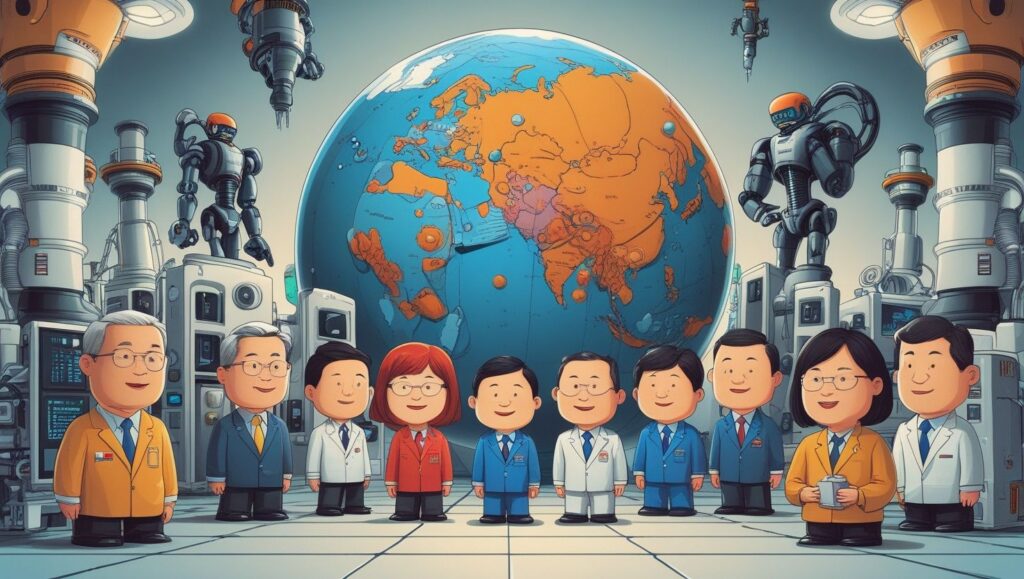Introduction
The Richest Countries in Science and Technology, Science and technology have become the backbone of modern progress. Nations that invest in these sectors lead the world in innovation and influence. Countries with strong economies dedicate significant resources to research and development. Consequently, they attract talent, foster creativity, and set global standards. Today, some nations are recognized as the richest in science and technology. These include the United States, China, Japan, Germany, and South Korea. Each contributes significantly to global technological growth. Moreover, these countries excel in robotics, artificial intelligence, space exploration, and medical research. Their impact extends beyond borders, shaping education, defense, and industries worldwide. Therefore, analyzing the richest countries in science and technology helps us understand global innovation trends. It also highlights the link between scientific advancement and economic stability. This article will explore these nations and their contributions.
United States: The Global Leader
The United States remains the global leader in science and technology. It invests heavily in research and development through both government and private sectors. American universities such as MIT, Stanford, and Harvard drive innovation worldwide. Furthermore, Silicon Valley stands as the hub of cutting-edge technologies. Companies like Apple, Google, Microsoft, and Tesla dominate the global market. The U.S. is also ahead in artificial intelligence, biotechnology, and aerospace engineering. NASA’s space programs continue to inspire progress and exploration. In addition, the U.S. has one of the highest numbers of patents filed annually. This reflects the strong focus on creativity and problem-solving. Moreover, collaborations with international researchers strengthen its global presence. The American economy thrives on technological industries, generating jobs and opportunities. Ultimately, the U.S. demonstrates how science and technology can drive national strength and global leadership.
China: The Rising Giant
China has emerged as a rising giant in science and technology. Over the past three decades, the nation transformed from a manufacturing hub to an innovation powerhouse. The government invests billions annually in research and development. Chinese universities and institutes contribute significantly to global publications. Moreover, the country excels in artificial intelligence, quantum computing, and telecommunications. Companies like Huawei, Tencent, and Alibaba reflect China’s growing dominance. Additionally, China’s space program has achieved remarkable milestones, including the Chang’e lunar missions. The Belt and Road Initiative also promotes technological exchange with other nations. Furthermore, China trains a large number of engineers and scientists every year. This talent base supports rapid innovation and progress. While the nation faces global competition, its advancements remain impressive. Therefore, China is not just following trends; it is setting them in many areas of technology.

Japan: Pioneer of Innovation
Japan has long been recognized as a pioneer of innovation. Its contribution to robotics, electronics, and automotive industries is unmatched. Companies like Sony, Toyota, and Panasonic symbolize Japanese excellence. Moreover, Japan invests heavily in research and has one of the highest ratios of researchers per capita. Its culture of discipline and precision drives technological success. The country is also a global leader in robotics, particularly in industrial and service robots. Furthermore, Japan excels in healthcare technology, providing advanced medical devices. The Shinkansen, or bullet train, demonstrates Japan’s focus on efficiency and progress. Universities and research institutions collaborate with industries to sustain innovation. Despite challenges such as an aging population, Japan continues to lead in scientific breakthroughs. Consequently, Japan proves that technological power can balance tradition and modernity. Its influence remains crucial in shaping the global technology landscape.
Germany: Engineering Excellence
Germany is synonymous with engineering excellence. As the largest economy in Europe, it plays a central role in global innovation. German industries are known for precision, quality, and advanced technology. Moreover, the nation invests significantly in renewable energy and sustainable technologies. Companies like Siemens, BMW, and Volkswagen highlight Germany’s technological strength. Its universities and research institutions work closely with industries to support advancement. Furthermore, Germany excels in industrial automation, biotechnology, and chemical engineering. The government also encourages startups, fostering creativity and entrepreneurship. Additionally, Germany’s role in the European Union enhances its global scientific influence. Its strong focus on vocational training ensures a skilled workforce. Moreover, Germany is deeply committed to environmental sustainability through green technologies. Therefore, it continues to balance economic growth with technological leadership. Germany remains a model of how science and engineering drive prosperity.
South Korea: Technology Powerhouse
South Korea is considered a global technology powerhouse. Despite its small size, it competes with the world’s largest economies. The country invests heavily in research and education. Furthermore, it has one of the fastest internet infrastructures globally. Companies like Samsung and LG are recognized for their innovation and global presence. South Korea also leads in electronics, semiconductors, and communication technologies. Moreover, its strong investment in artificial intelligence and robotics is remarkable. The government actively supports innovation through research programs and funding. Universities also play a crucial role in producing skilled scientists and engineers. In addition, South Korea’s culture values education, pushing the younger generation toward scientific achievement. Its rapid development from a war-torn country to a leader in technology is inspiring. Therefore, South Korea demonstrates how dedication and vision can create global influence in science and technology.
United Kingdom: Research and Discovery
The United Kingdom has a rich history of scientific discovery and innovation. From Isaac Newton to modern-day pioneers, British scientists shaped global knowledge. Today, the UK invests strongly in biotechnology, healthcare, and artificial intelligence. Moreover, universities like Oxford, Cambridge, and Imperial College are internationally respected. They produce groundbreaking research that influences industries worldwide. Additionally, the UK is recognized for advancements in space research and renewable energy. Its startups are also gaining attention in fintech and digital technology. Furthermore, the government supports innovation through policies and funding. The UK’s collaborations with European and global partners enhance its scientific impact. While Brexit posed challenges, the country remains a leader in global science. Consequently, the UK continues to inspire innovation through creativity and research excellence. Its influence in science and technology will remain significant in the years ahead.

France: Blending Culture and Innovation
France is another European leader in science and technology. It blends cultural heritage with modern innovation. French scientists have contributed greatly to physics, medicine, and space research. Today, France is home to Airbus, one of the world’s leading aerospace companies. Moreover, French universities and research centers excel in biotechnology and renewable energy. The country also invests heavily in artificial intelligence and digital technologies. Additionally, government initiatives encourage innovation and startup growth. France collaborates with European partners on large-scale projects, including nuclear energy research. Furthermore, the French education system fosters creativity and analytical thinking. Its investments in green technology demonstrate a commitment to sustainable growth. Moreover, Paris has become a hub for startups and technological entrepreneurship. Therefore, France proves that tradition and modernity can coexist in innovation. Its role in global science remains vital and respected.
Switzerland: Precision and Research
Switzerland is globally admired for precision and research excellence. Although small, it plays a powerful role in science and technology. The country is known for advanced pharmaceuticals, biotechnology, and engineering. Companies like Novartis and Roche lead global healthcare innovation. Moreover, Switzerland hosts the European Organization for Nuclear Research (CERN). This institution has contributed to groundbreaking discoveries in physics. Swiss universities are among the top in global rankings. Additionally, the nation invests significantly in research and development. Its banking and financial technologies also show remarkable innovation. Furthermore, Switzerland supports startups and entrepreneurship with favorable policies. The focus on quality education ensures a skilled workforce. Moreover, its political stability attracts global talent and researchers. Therefore, Switzerland proves that even smaller nations can dominate in science. Its precision, discipline, and commitment to research remain unmatched worldwide.
Israel: Startup Nation
Israel is famously known as the “Startup Nation.” Despite its small population, it leads in innovation and technology. The country invests a high percentage of its GDP in research and development. Moreover, Israel excels in cybersecurity, artificial intelligence, and biotechnology. Its universities, such as the Technion, produce world-class engineers and scientists. Additionally, military research contributes significantly to technological growth. Companies like Check Point and Mobileye highlight Israel’s achievements. Furthermore, Israel’s thriving startup ecosystem attracts global investors. Its culture encourages creativity, risk-taking, and problem-solving. Moreover, government policies strongly support innovation and entrepreneurship. The country also collaborates closely with the United States and Europe. In addition, Israel plays a major role in agricultural technology, helping solve global food challenges. Therefore, Israel proves that size does not limit scientific progress. Its innovative spirit continues to inspire nations worldwide.
Conclusion
Science and technology are essential for national progress and global influence. Countries that prioritize research and innovation shape the future. The United States continues as a leader, while China rises rapidly. Japan, Germany, and South Korea demonstrate consistency and creativity. Meanwhile, the UK, France, Switzerland, and Israel show that both tradition and modern strategies matter. Together, these nations drive global scientific growth. Furthermore, their investments in education, research, and infrastructure support long-term development. Other countries also aspire to join this league of innovation leaders. Therefore, analyzing these richest countries in science and technology helps us learn valuable lessons. It highlights the importance of vision, policies, and human talent in shaping progress. Ultimately, science and technology remain the foundation for global leadership and prosperity.
References
- UNESCO Institute for Statistics. (2023). Research and Development Data. Retrieved from uis.unesco.org
- World Intellectual Property Organization. (2023). Global Innovation Index 2023. Retrieved from wipo.int
- OECD. (2022). Science, Technology and Innovation Outlook. Retrieved from oecd.org

8q8omc
w5wb9p